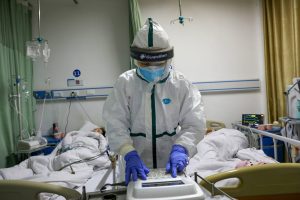 New Delhi : The Coronavirus COVID-19 is spread primarily transmitted between people through respiratory droplets and contact routes and not an airborne transmission, according to a recent publication by the World Health Organisation (WHO). “Respiratory infections can be transmitted through droplets of different sizes: when the droplet particles are >5-10 μm in diameter they are referred to as respiratory droplets, and when then are <5μm in diameter, they are referred to as droplet nuclei,” read a statement.
New Delhi : The Coronavirus COVID-19 is spread primarily transmitted between people through respiratory droplets and contact routes and not an airborne transmission, according to a recent publication by the World Health Organisation (WHO). “Respiratory infections can be transmitted through droplets of different sizes: when the droplet particles are >5-10 μm in diameter they are referred to as respiratory droplets, and when then are <5μm in diameter, they are referred to as droplet nuclei,” read a statement.
It added that droplet transmission occurs when a person is in close contact (within 1 m) with someone who has respiratory symptoms (e.g., coughing or sneezing) and is therefore at risk of having his/her mucosae (mouth and nose) or conjunctiva (eyes) exposed to potentially infective respiratory droplets.
“Transmission may also occur through fomites in the immediate environment around the infected person. Therefore, the transmission of the COVID-19 virus can occur by direct contact with infected people and indirect contact with surfaces in the immediate environment or with objects used on the infected person (e.g., stethoscope or thermometer),” it further added.
Airborne transmission is different from droplet transmission as it refers to the presence of microbes within droplet nuclei, which are generally considered to be particles <5μm in diameter, can remain in the air for long periods of time and be transmitted to others over distances greater than 1 m, said WHO.
In the context of COVID-19, the airborne transmission may be possible in specific circumstances and settings in which procedures or support treatments that generate aerosols are performed; i.e., endotracheal intubation, bronchoscopy, open suctioning, administration of nebulized treatment, manual ventilation before intubation, turning the patient to the prone position, disconnecting the patient from the ventilator, non-invasive positive-pressure ventilation, tracheostomy, and cardiopulmonary resuscitation.
There is some evidence that COVID-19 infection may lead to intestinal infection and be present in faeces. However, to date, only one study has cultured the COVID-19 virus from a single stool specimen, added WHO. There have been no reports of faecal−oral transmission of the COVID-19 virus to date.
WHO also recommended droplet and contact precautions for those people caring for COVID-19 patients and airborne precautions for circumstances and settings in which aerosol-generating procedures and support treatment are performed, according to risk assessment.
It also recommended the utmost importance of frequent hand hygiene, respiratory etiquette, and environmental cleaning and disinfection, as well as the importance of maintaining physical distances and avoidance of close, unprotected contact with people with fever or respiratory symptoms.
A total of 1,026,974 COVID-19 cases have been reported across the globe with 53,975 deaths reported till 4.30 pm (IST) on Friday, according to Johns Hopkins University data.
Bureau Report
Leave a Reply